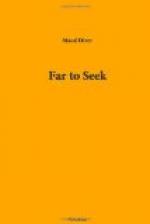“No—King of me—Indian wife: making too much trouble again!”
“Lilamani! How dare you! Come here.”
His attempt at sternness took effect. In one swift rush—sari blown backward—she came: and he, smitten with self-reproach, folded her close; while she clung to him in mute passionate response.
“Beloved,” she whispered. “Not to worry any more in your secret heart. I told—he understands.”
“Roy——? My darling! But what——?” His incoherence was a shameless admission of relief. “You couldn’t—you haven’t told him——?”
“Nevil, I have told him all. I saw lately this trouble in your thoughts: and to-day it came in my mind that only I could speak—could give command that—one kind of marriage must not be.”
He drew her closer, and she suppressed a small sigh.
“Wasn’t the boy angry?”
“Only at first—on account of me. He is—so very darling, so worshipping—his foolish little Mother.”
“A weakness he shares with his father,” Nevil assured her: and in that whispered confession she had her reward. For after twenty-three years of marriage, the note of loverly extravagance is as rare as the note of the cuckoo in July.
“Sit, little woman.” He drew her down to the window-seat, keeping an arm round her. “The relief it is to feel I can talk it all over with you freely. Where the dickens would we be, Roy and I, without our interpreter? And she does it all unbeknownst; like a Brownie. I have been worrying lately. The boy’s clean gone on his blessed idea. No reasoning with him; and the modern father doesn’t venture to command! It’s as much as his place is worth! Yet we see the hidden dangers clearer than he can. Wouldn’t it be wiser to apply the curb discreetly before he slips off into an atmosphere where all the influences will tug one way?”
It was the sane masculine wisdom of the West. But hers—that was feminine and of the East—went deeper.
“Perhaps it is mother-weakness,” she said, leaning against him and looking away at a purple cloud that hung low over the moor. “But it seems to me, by putting on the curb, you keep only his body from those influences. They would tug all the stronger in his soul. Not healthy and alive with joy of action, but cramped up and aching, like your legs when there is no room to stretch them. Then there would come impatience, turning his heart more to India, more away from you. Father had that kind of thwarting when young—so I know. Dearest one, am I too foolish?”
“You are my Wisest of Wise.—Is there more?”
“Yes. It is this. Perhaps, through being young and eager, he will make mistakes; wander too far. But even if he should wander to farthest end, all influence will not tug one way. He will carry in his heart the star of you and the star of me. These will shine brighter if he knows how we longed—for ourselves—to keep him here; yet, for himself, we let him go. I have remembered always one line of poetry you showed me at Como. ‘To take by leaving, To hold by letting go.’ That is true truth for many things. But for parents truest of all.”




